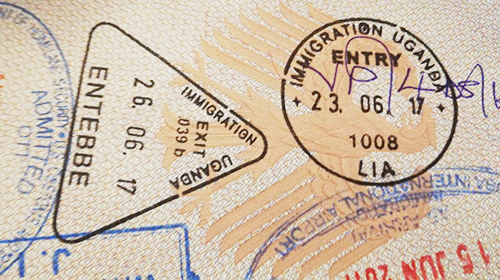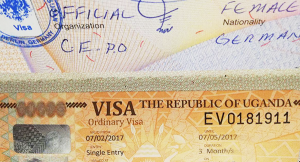
VISA
I. WHAT IS A VISA?
- A visa is an official document that allows you to legally enter a foreign country.
- The visa is usually stamped or glued into your passport.
- There are different types of visas that give you different rights of what you are allowed to do in the host country.
More information when online:
VISA_INFORMATION

II. WHY DO I NEED A VISA TO TRAVEL?
- You need a visa, because most countries require a visa to legally enter the country. You have to apply for the visa at the other country’s embassy located in your country. Embassies are usually located in the capital city.
- Most of the time, you need to have a visa before they will allow you to get on a plane.
- A few countries offer visas upon arrival, but no European country offers this option.
III. HOW DO I APPLY FOR A VISA?
To apply for a visa, you need to visit the embassy of the country you want to visit. For this, you will need to:
- Make an appointment at the embassy of the country of your destination. It can sometimes take weeks to get an appointment, so plan ahead.
- Download & fill out the visa application form.
- Collect all the required documents.
- Email scanned copies of all the documents to the embassy prior to your interview.
- Bring all your original documents to your interview.
IMPORTANT: You have to bring original documents (no photocopies or scans) to your interview.
German Embassy Ghana
For Germany you need a visa in Ghana you would apply at:
German Embassy Ghana
No. 6, Kenneth Kaunda Road
North Ridge/ Accra
Visa and Consular Section:
Tel: +233 30 221 10 00
info@accra.diplo.de
More information when online:
GERMAN_EMBASSY_ACCRA
German Embassy The Gambia (located in Dakar, Senegal)
There is no German embassy in The Gambia. Applicants need to email their documents to the Embassy in Dakar, Senegal and will have to travel to Dakar for the interview. Passport pick up might be possible in Banjul at the German liaison office, but this can change.
More information when online:
GERMAN_EMBASSY_DAKAR
German Embassy Dakar
20, Avenue Pasteur
Dakar/ Senegal
Tel: +221 33 889 48 84
banjul@daka.diplo.de
rkinfo@daka.diplo.de
More information when online:
The GAMBIA_VISA_INFORMATION
1. Visa requirements
- A visa application form (download from their website or picked up at embassy)
- Your passport
- An extra passport photograph
- A flight itinerary
- A hotel booking
- A letter of invitation
- Proof of purpose for travelling
- Proof of income
- Proof of financial support during the trip
- Covid-19 form
- Proof of Vaccination
- Payment for visa application fees
- Travel insurance
IMPORTANT: Specific requirements (such as which vaccines are needed) and forms will vary. Follow embassy guidelines.
2. Potential problems obtaining a visa
- Missing the appointment at the embassy
- Not having all required documents
- Not having the financial support needed
- Bring in ill health
- Having a criminal history
- Posing a security risk
- Covid-19 rules that might restrict entry into countries
3. Invitation letter for visas
Some countries require you to have a letter of invitation.
- A letter of invitation is a formal letter from the person you intend to visit stating that they are inviting you to visit them.
- Invitation letters give travel authorities proof that the reason for your visit is temporary and has a valid reason.
- The letter must list the reason for your visit and why it is necessary.
- The letter must list the time period of your stay.
- The letter must contain contact information for the person writing the letter.
4. Visa interview
There is an interview process in order to get a visa. Common questions asked are:
- Why do you want to travel to X country?
- Why do you want to visit at this specific time?
- Do you have a criminal record?
- Are you travelling with someone else?
- Who will you be visiting?
- How long will you stay?
- Where will you stay?
- Have you booked airline tickets?
- Do you have health insurance for this trip?
- If you are employed, can you provide a letter attesting that you have received a leave of absence from your work for the duration of the trip?
- Will you return to your home country after your visit?
5. Visa fees
- Each country has different fees for obtaining a visa.
- A visa for Germany cost between $100 and $150 USD
6. Visa Processing Times
- The time it takes to get a visa varies by country. Some are faster, some are slower.
- During the interview you will be told when to come to pick up your visa.
- It usually is somewhere between 10-21 days after the interview.
- You can usually pay extra to have the visa go through an express processing and be ready faster.
7. Visa Services at the Embassy
- Consulates and Embassies often offer visa application services and assistance.
- They have up-to-date information regarding visa and travel requirements.
- For appointments, you have to schedule these online. You cannot make an appointment in person.
- The Embassy is also where you will pick up your visa, once it is approved and ready.
IV. TYPES OF VISAS
1. Travel/tourist visa
- A tourist visa allows you to enter a foreign country as a tourist for leisure purposes.
- You can only stay for a set amount of time.
- You are not allowed to work or engage in any business activities in the host country.
2. Work visa
A work visa is needed if you want to work in the host country or engage in business activities. There are different categories of work visas as well.
- Blue Card EU: This is a work visa for people who have a recognized university degree AND already have an official job offer.
- Work with Contract: This is a work visa for people who have university degree or vocational qualification AND already have an official job offer.
- Work with qualifications that are partially recognized: If your vocational qualifications are not fully recognized, you can get a visa to complete extra qualifications in Germany.
- Work as an IT-specialist with work experience: You can get a work visa to work in the IT sector in Germany, even if you do not have a recognized degree. But you need to have IT work experience.
- Job Seeker: IF you have a recognized university degree or two-year vocational training degree that is recognized by Germany, you can get a visa to stay for up to six months in order to find a job corresponding to your qualifications.
3. Business visa
- A business visa allows you to enter the host country and engage in business activities without joining that country’s labor market.
- You are entitled to enter as a business professional, but all of your business affiliations, income, and place of residence have to be based in your home country.
- Individuals may require a business visa if they are travelling on (behalf of a company based in their home country) to another country, to do business with the other company.
- You will need a business visa to attend a business conference.
- On a business visa, you must show that they are not receiving income from anyone based in the host country.
4. Student visa
- A student visa allows you to enroll at a postsecondary educational institution.
- If you have already been accepted at a foreign university, you can apply for a study visa, but you must prove that you have enough money to support yourself in the host country for the length of your studies. This is true at all levels of education (bachelor, master, PhD programs).
- You can get a student visa to complete a language course or internship, but you must prove that you have enough money to support yourself in the host country for the length of the class or internship.
5. Vocational training visa
- For Germany, you can get a vocational training visa if you already have an official offer from a German company offering you an apprenticeship AND you speak German at the B1 level.
- B1 is based on the Common European Framework of Reference for Languages (CEFR). The levels go from A1 (beginner) to C2 (uses language perfectly). B1 falls in the middle. It is defined as being able to understand the main points when hearing language spoken, being able to talk about work, school, leisure, and family, and being able to express yourself clearly and report on experiences, events, hopes, and goals. You have to be able to use the past tense, present tense, and future tense accurately.
- For Germany, you can also get a vocational training visa that allows you to enter Germany to seek an apprenticeship, IF you are younger than 25 AND speak German at the B2 level.
- B2 is based on the Common European Framework of Reference for Languages (CEFR). The levels go from A1 (beginner) to C2 (uses language perfectly). B2 is defined as understanding complex texts on concrete and abstract topics, as well as technical discussions in your area of specialisation, being able to communicate spontaneously and fluently with locals without needing great effort to express yourself or be understood, and being able to express your opinion and position on current events and political issues in a clear and detailed manner.
6. Visa for the self-employed
- You can also get a self-employed visa to start a business in Germany if there is commercial interest or regional demand for your products and services, your business activity is creating jobs, and you have secured financing for your business.
7. Research visa
8. Spousal visa
- Marriage to a German national: If you want to marry a German national, you have to register the wedding at a registry office in Germany. Both you and your partner have to be at least 18 years old. You need to prove that you have enough money to support yourself in Germany. You also need to have a basic knowledge of German (A1-level). You need the visa to enter the country, in order to marry. After the wedding, you need to apply for a residence permit.
- Marriage to a foreign national living in Germany: In order to qualify for this visa, the wedding must be registered at a registry office in Germany. The person you are marrying must have a valid residence permit, a Blue Card EU, an Intra-Corporate Transfer (ICT) card, a permanent settlement permit, or a permit for permanent stay in the European Union. You need to prove that you have enough money to support yourself in Germany.
- Joining your German spouse: This visa is for people already married to a German national. Both partners must be at least 18 years old. And you must have at least a basic knowledge of German (A1-level).
- Joining your spouse, who is an EU/EEA national: This visa is for people married to a citizen of an EU country, the United Kingdom, Liechtenstein, Iceland, Norway, or Switzerland. You have to prove that you have the financial means to fully support yourself in Germany. You do not need to speak German.
- Joining your spouse, who is a foreign national: This visa is for people married to a foreign national who holds either a residence permit, a Blue Card EU, an ICT Card, a permanent settlement permit, or a permit for permanent stay in the European Union. You and your spouse must both be at least 18 years old.
- There is also a visa application if you want to join your child or your parents, who are legally residing in the host country.
More information when online:
GERMAN VISA TYPES
V. WHAT DOES A VISA LOOK LIKE ?
- A visa will either be stamped or a paper glued into your passport.
- It includes your name, passport number, place of birth, reason for travel, and expiration date.

